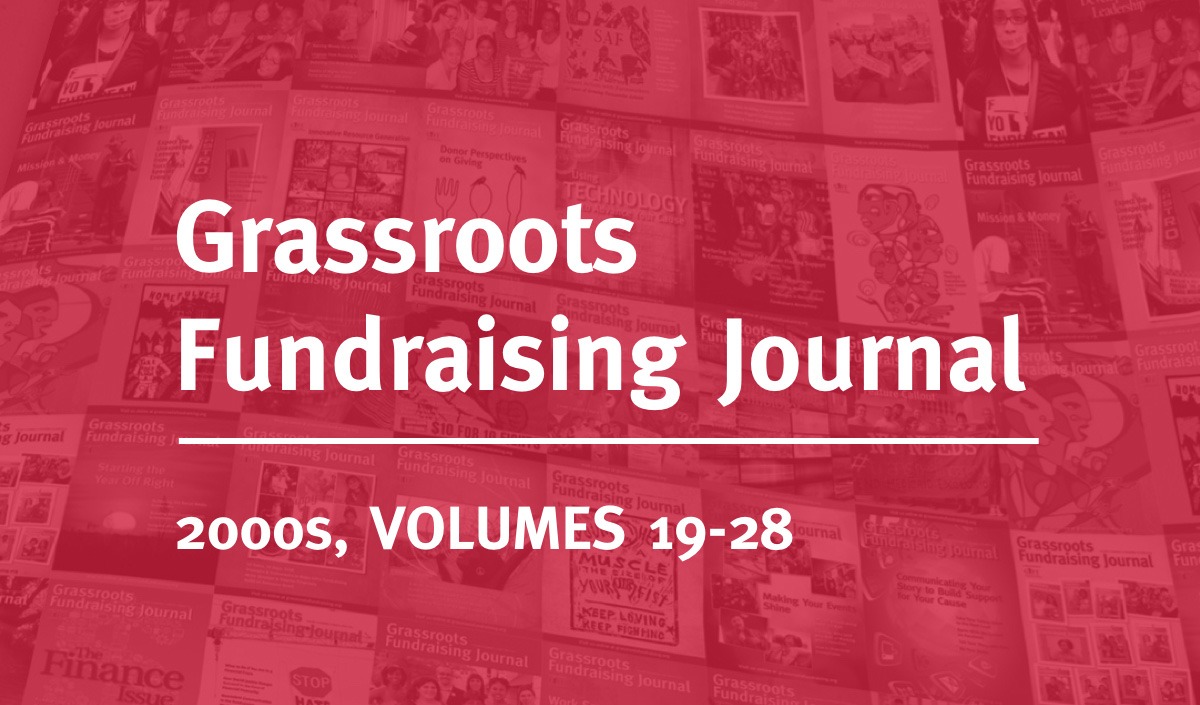
Editors’ note: This article, first published in print during Jan/Feb 2002, has been republished for Nonprofit Quarterly with minor updates.
A Gift Acceptance Policy specifies what kind of donations your organization will — and sometimes will not — accept. Groups seeking large gifts for capital and endowment projects, for example, need to decide if they will accept gifts that may be difficult to sell, or require management skills and time beyond what is appropriate to expect of staff, such as real estate, jewelry, or art. Groups seeking corporate funding may wish to think about which funders they are approaching. Many groups have a simple policy such as, “The Board of XXX Group reserves the right to decline any gift that is deemed not to be in the best interest of the group or that is beyond our resources to manage.” In this article, Rick Cohen argues that groups may wish to go further, particularly in dealing with corporate funding.
The concept of “gift acceptance policies” sounds passive, as though nonprofits choose to snag some offers of grants that come along and pass on others. Though it is for many organizations a rare occurrence, corporate givers do offer unsolicited gifts. Such has been the case with the organization I direct, the National Committee for Responsive Philanthropy (NCRP). NCRP is a philanthropic advocacy “watchdog” that promotes increased philanthropic giving to disenfranchised and disadvantaged populations.
NCRP is a small but somewhat influential critic of the world of philanthropy. There are times when a funder —be it an individual, corporation, or foundation — has offered to give money to NCRP with an agenda in mind. Such was the case when an intermediary asked us to consider taking a pretty sizable grant from a corporation with a troubling history of exploiting child laborers in the Third World. The intermediary tried to sell us on helping the corporation look good in exchange for what they characterized as desperately needed hard money for the always cash-strapped philanthropic advocacy group. NCRP had the sense to turn the offer down.
Another time a careless error left us in the position of receiving a foundation grant to examine the problems of tobacco-linked philanthropy to racial and ethnic groups at the same time that we were receiving a small grant from one of the cancer-causing corporations themselves. Needless to say, at that time NCRP had no formal gift acceptance policy. Even more remarkably, we completed a study on racial and ethnic grantmaking with a companion workbook on principles for corporations and nonprofits. Still, there seemed to be little impetus on the part of the NCRP board to generate a policy. Drawing on the excel-lent guidance in our research on corporate grantmaking for that study, I decided to apply some fundraising medicine to NCRP in the spirit of “doctor, heal thyself.”
I saw that a gift acceptance policy would provide our fundraising with important guidance, as such policies address three key questions:
Sign up for our free newsletters
Subscribe to NPQ's newsletters to have our top stories delivered directly to your inbox.
By signing up, you agree to our privacy policy and terms of use, and to receive messages from NPQ and our partners.
- What kinds of corporations will a nonprofit solicit for funding, and what kinds will it avoid or reject?
- What conditions or restrictions imposed by the grant-maker will the nonprofit accept?
- How will the nonprofit evaluate corporate grant makers as potential funders?
DEVELOPING CORE STANDARDS
NCRP began by looking at various gift acceptance strategies and alternatives, and applying various “smell tests” and other methods for considering corporate grants. At first, some board and staff suggested policies in which NCRP would solicit and accept corporate grants without limitation. This suggestion was based on the common theory that every corporation has some problems someplace in environmental, racial discrimination, and other areas of corporate behavior, so there is no truly “clean” corporate charitable funding. In fact, our own report had cited the increasing interest of corporations in “strategic grant making” and corporate bottom-line considerations, making charitable intent suspect. So why not simply take the money, and by NCRP’s use of the funds, make it charitable and productive?
Though many nonprofits encounter this typical argument, for us it was damning all corporate funding with too broad a brush. We felt we needed to adopt policies consistent with NCRP’s history as a philanthropic watchdog promoting increased philanthropic giving for those in the U.S. with the least wealth and least economic opportunity.
Moreover, I felt that it was crucial to our credibility and reputation that we embrace the standards we were promoting for others. The adoption and use of a gift acceptance policy conveys to the outside world what kind of organization you are, what you believe, what you value. The policy we developed incorporates critical components of NCRP’s beliefs, including our anti-racism commitment; our opposition to discrimination based on gender or beliefs; our support for environmental justice, social justice, and civil rights; and our commitment to working men and women and organized labor. Yet the policy is meant to be uncomplicated and relatively easily applicable. It has the following five core standards:
- We should seek and accept corporate funds that clearly fit our agenda and give us desirable flexibility in their use. That doesn’t mean that we believe that corporate money comes without strings or that corporate money is somehow more restrictive than foundation funding, but we should be seeking funding that isn’t so restrictive that it prevents us from doing what we want and need to do.
- We should not seek or accept funding from corporate grantees that expect a quid pro quo from us in terms of public policy or industry regulation. For example, were a grant from a bank to come with the expectation that we would testify in favor of the bank during a merger review, that would be unacceptable.
- We should not seek or accept funding from corporations that expect NCRP to promote corporate products in our publications or at our meetings and conferences.
- We should not seek or accept any grants that would compromise NCRP’s mission or credibility. Although fundraising is a proactive initiative, meaning that we should be able to avoid potential funders whose behavior or policies would compromise our credibility, we should have a process for allowing staff and board to review our list of potential corporate funders and point out potential problems. Moreover, we should have an internal process for conducting due diligence on potential corporate funders to ensure that we are appropriately informed about issues and prepared to reject potential funding.
- We should be open to receiving a grant from a corporation that has been involved in a public policy controversy or hazardous mishap once the controversy or mishap has passed and the corporation has taken significant steps toward amelioration of both the incident and the policy. That doesn’t mean we should accept grants from corporations that simply want to use NCRP to “look good,” but we shouldn’t reject grants due to past corporate histories that are clearly no longer indicative of the corporations’ current practices and policies.
- Since NCRP is dedicated and committed to a just and democratic society and the promotion of sustainable development, human rights, human dignity, and equal opportunity, NCRP will not solicit or accept contributions from corporations whose operations include practices we deem unacceptable and contrary to the values implicit in NCRP’s mission. Among those corporate operations and policies that make corporate funders unacceptable are the following:
-
-
- production and promotion of tobacco products
- production and promotion of firearms
- human rights abuses•active anti-labor policies, including sweatshop abuses, child labor infractions, etc.
- blatant and avoidable environmental abuses
-
Finally, NCRP identified the policies we want to see in potential corporate givers:
-
-
- Corporations with women and minorities in management positions and on the boards of directors, and with progressive policies regarding purchasing from or investing in women- and minority-owned businesses, and with progressive policies regarding hiring programs for the disabled, and with progressive policies toward gays and lesbians in the workplace.(We should avoid companies with a pattern of discrimination based on gender, race, religion, disability or sexual orientation.)
- Corporations with a commitment to and history of fair labor negotiations. (We should avoid companies that are listed on the national AFL-CIO boycott list or that otherwise violate basic labor laws or engage in unfair labor practices.)
- Corporations that show respect for the natural environment in their ways of conducting day-to-day business. (We should avoid corporations that frequently or consistently violate federal, state, and local environ-mental regulations.)
- Corporations that pay fair wages, support human rights, and protect the environment when they operate in less developed nations.
- To identify corporations worth soliciting for support, NCRP will look to corporations on the Domini Social Equity Fund list, corporations meeting the Citizens Funds social screens, and corporations meeting the Council on Economic Priorities’s corporate con-science standards.
-
THE RESULT: THINKING MORE DEEPLY
The gift acceptance policies we developed are first and foremost a reaffirmation of NCRP’s organizational mission, a tangible reminder of why we exist and what we stand for. We realize that the application of the values in the gift acceptance policies need not be limited to corporate donors. Foundations have biases, individual donors have specific interests, foundations and donors set conditions just as corporate grantmakers do.
Besides the expansion of their applicability beyond corporations, the other benefit of the policies was that they gave us a chance to rearticulate our core organizational values and beliefs. For the organization — and for me personally — the NCRP gift acceptance policy reconnected us with the grassroots organizing that is raising questions about global corporate policies. Moreover, the inclusion of the AFL-CIO corporate boycott list as a core component of the gift acceptance policy strengthened NCRP’s commitment to organized labor, to fair wage campaigns, to social justice for America’s working families.
The best gift acceptance policies are based not on a crude calculation of how to get grant monies from corporate donors, but are statements of principles and values that motivate the nonprofit’s work in our economy and society. For this reason, I am more than pleased that NCRP con-fronted its own values and beliefs and examined their applicability to NCRP’s fundraising strategies and potential for fundraising within and beyond corporate grantmakers. GFJ











